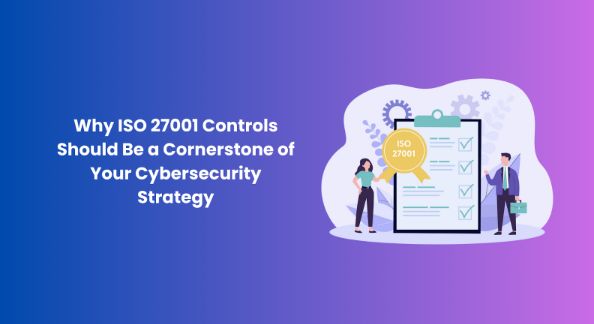Why ISO 27001 Controls Should Be a Cornerstone of Your Cybersecurity Strategy
Because cyberattacks and data breaches are becoming more complex and common, businesses need to take a proactive, all-encompassing strategy for cybersecurity. An efficient method is by putting ISO 27001 Controls in place. The internationally acclaimed ISO 27001 information security management standard offers a systematic foundation for safeguarding confidential data. We will discuss the importance of ISO 27001 controls and the significance of ISO 27001 Training.
Table of contents
- The Need for Robust Cybersecurity
- ISO 27001: A Global Standard for Information Security
- Understanding ISO 27001 Controls
- The Importance of ISO 27001 Controls
- Comprehensive Risk Management
- Legal and Regulatory Compliance
- Enhanced Reputation and Trust
- Proactive Security Measures
- Improved Incident Response
- Employee Awareness and Training
- Implementing ISO 27001 Controls
- Conclusion
The Need for Robust Cybersecurity
The ever-changing landscape of cybersecurity threats presents enormous dangers to companies across all sectors and sizes. Ransomware attacks, phishing schemes, data breaches, and other risks are among them. A successful hack can have disastrous effects, including monetary losses, harm to one’s reputation, and legal ramifications. Consequently, businesses need to invest heavily in cybersecurity measures to protect their data and keep stakeholders’ trust.
ISO 27001: A Global Standard for Information Security
A widely accepted standard for information security management systems (ISMS) is ISO 27001. It offers a systematic and organised strategy for locating, evaluating, and reducing information security threats. This standard is extremely flexible and adaptable because it may be implemented by any organisation that manages sensitive data, regardless of the industry or sector.
Understanding ISO 27001 Controls
Controls for ISO 27001 are an essential part of the standard. Organisations use these policies, procedures, and strategies to safeguard their information assets. These controls are divided into 14 areas, each focusing on a distinct information security issue. A few of the important domains are:
- It is establishing thorough and precise policies that specify how the organisation will handle information security.
- Recognising and categorising information assets and making sure they are protected for the duration of their existence.
- Controlling user access to data and information systems to stop illegal access.
- We are creating and putting into practice protocols for handling and minimising information security events.
- Ensuring that, in the case of a disruption, vital data and systems are accessible.
- Ensuring the company follows all applicable information security laws, rules, and contractual obligations.
The Importance of ISO 27001 Controls
Now, let’s explore the reasons why your cybersecurity plan should be built around ISO 27001 controls:
Comprehensive Risk Management
ISO 27001 procedures offer a systematic approach to recognising and controlling information security threats. Organisations can evaluate possible dangers and take proactive measures to mitigate them by putting these controls in place. This all-encompassing approach to risk management aids in lowering the probability of security events and the consequences they cause.
Legal and Regulatory Compliance
In the current legal climate, several industries are subject to strict data protection and privacy regulations. ISO 27001 controls help enterprises ensure compliance with these requirements by providing a framework for data security and protection. In addition to preventing legal ramifications, this gives clients—who are growing more concerned about the security and privacy of their data—more trust.
Enhanced Reputation and Trust
Reputation can be improved by an organisation demonstrating a strong commitment to information security through ISO 27001 measures. Businesses prioritising data security have a higher chance of earning the trust and business of their stakeholders, partners, and customers. Businesses can stand out and obtain a competitive advantage by showcasing their adherence to international standards.
Proactive Security Measures
The controls outlined in ISO 27001 are intended to be proactive rather than reactive. Rather than waiting for a security breach, companies may find holes and flaws in their procedures and systems in advance. This proactive strategy reduces the possibility of harm and aids in the prevention of security problems.
Improved Incident Response
Cyber attacks can affect any organisation, even if strong preventive measures are in place. Controls for incident reaction and management are also included in ISO 27001 standards. In the case of a breach, having a clearly defined incident response plan guarantees that the company can act swiftly and decisively to lessen the damage and recover more rapidly.
Employee Awareness and Training
The ISO 27001 controls strongly emphasise the awareness and training of employees about information security maintenance. Workers are frequently the weakest link in cybersecurity, but they may be turned into important assets by receiving the right training and awareness campaigns. Providing staff with ISO 27001 training can greatly decrease the likelihood that human error may result in security breaches.
Implementing ISO 27001 Controls
Risk assessment and gap analysis are the first steps in the organised process that implements ISO 27001 procedures. An organisation can create and practice policies and procedures to close these gaps in security once it has assessed its current posture and determined where improvements are needed. The ISMS is regularly reviewed and monitored to ensure the controls are effective and flexible enough to respond to changing threats.
Conclusion
ISO 27001 procedures provide a thorough framework for controlling information security risks and safeguarding sensitive data. You can show your organization’s dedication to security and compliance while strengthening its resistance to cyber threats by including ISO 27001 controls in your cybersecurity plan. Putting money into ISO 27001 implementation and training can be a calculated risk that will pay off in the form of lower cybersecurity risks, improved customer trust, and improved reputation. To safeguard your company’s future, take proactive measures now rather than waiting for a security breach to happen.



